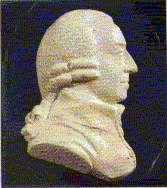
1723-1790

1723-1790
Adam Smith
was born Kirkcaldy, Scotland. He attended the universities of Glasgow
and Oxford, where after he gave lectures from 1748-1751. The topics
of his lectures covered rhetoric, ethics, political economy and jurisprudence.
At the University of Glasgow, Smith
became professor of logic in 1751 and then professor of moral philosophy
in 1752. In 1759, he published some of his lectures in his "Theory
of Moral Sentiments," which discussed how ethical conduct is the glue
that holds society together, and the relations between human motives and
actions under divine guidance.
In 1763, Smith
resigned from his position at Glasgow, and became the tutor of Henry Scott.
They toured Europe for 18 months, and Smith mingled among many philosophers
whom based their beliefs of politics and economics on the dominance of
natural law, wealth, and order.
From 1766-1776,
he lived in Kirkcaldy, moving to London in 1776, where he published "An
Inquiry into the Nature and Causes of the Wealth of Nations," which
examined the consequences of economic freedom. It covered concepts such
as self interest, the function of markets, the division of labor, and the
implications of a laissez-faire (leave alone) economy. Smith believed
that a free economy would be more productive than one regulated by the
government, and these beliefs were based on the three natural laws of economics:
1. The Law of Self-Interest- People act for selfish reasons. They work for their own good, not for the good of another person.
2. The Law of Competition- Everyone competes with one another. To be successful, one must be efficient and sell their product at a lower price than others, forcing people to make better products in order to stay in business.
3. The Law of Supply and Demand- When the supply exceeds the demand, prices are lowered . The low price can drive some people out of business. This process would continue until there is the right amount of businesses for a specific product to meet consumer demand.
Adam Smith stated and explained the laws of a free economy that still hold true today. His view was that the production and selling of goods can be stimulated, and that the living standard would get better only through the creation of private industries with minimal control by the government. He is rather famous for his expression of the "invisible hand": Every person, while pursuing his own good is led, as if by an invisible hand, to act in the most beneficial way for everybody. Therefore, Adam Smith felt the natural laws would never hold if the government were to interfere.

More Literature by Adam Smith
![]() On
the Nature of Demand
On
the Nature of Demand
![]() The
Intelligence Economy
The
Intelligence Economy